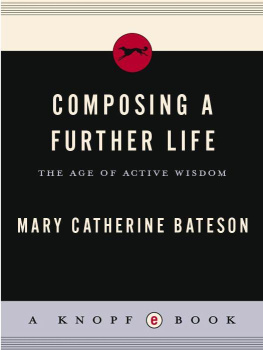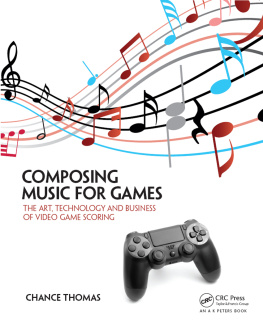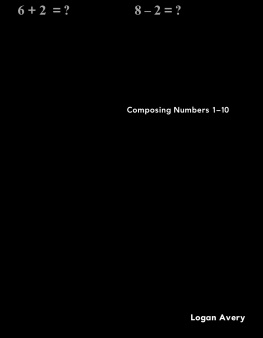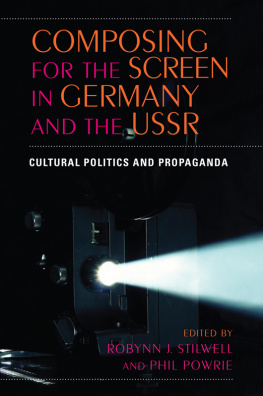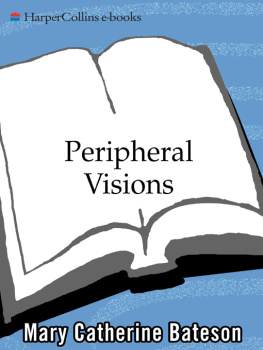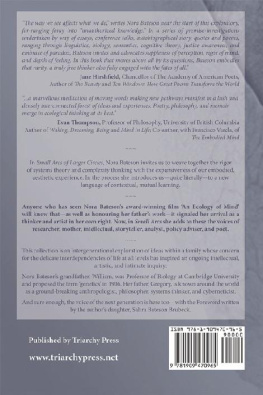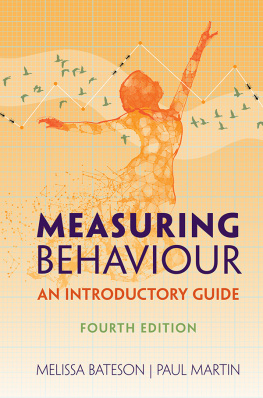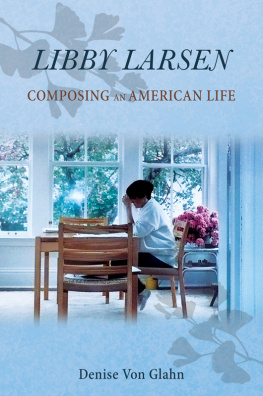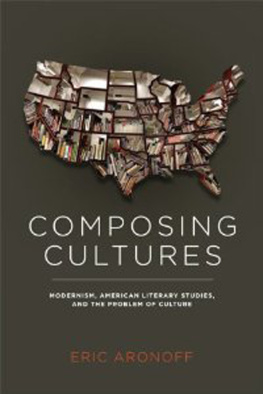ALSO BY MARY CATHERINE BATESON
Willing to Learn: Passages of Personal Discovery
Full Circles, Overlapping Lives: Culture and Generation in Transition
Peripheral Visions: Learning Along the Way
Composing a Life
With a Daughters Eye: A Memoir of Margaret Mead and Gregory Bateson
Our Own Metaphor: A Personal Account of a Conference on the Effects of Conscious Purpose on Human Adaptation
Arabic Language Handbook
With Gregory Bateson
Angels Fear: Towards an Epistemology of the Sacred
With Richard Goldsby
Thinking AIDS: The Social Response to the Biological Threat
THIS IS A BORZOI BOOK PUBLISHED BY ALFRED A. KNOPF
Copyright 2010 by Mary Catherine Bateson
All rights reserved. Published in the United States by Alfred A. Knopf, a division of Random House, Inc., New York, and in Canada by Random House of Canada Limited, Toronto. www.aaknopf.com
Knopf, Borzoi Books, and the colophon are registered trademarks of Random House, Inc.
Library of Congress Cataloging-in-Publication Data
Bateson, Mary Catherine.
Composing a further life : the age of active wisdom /
Mary Catherine Bateson. 1st ed.
p. cm.
eISBN: 978-0-307-59422-8
1. Women intellectualsUnited StatesBiography.
2. Womens studiesBiographical methods. I. Title.
HQ1233.B37 2010
920.72dc22 2010001796
v3.1
LOOKING FORWARD
This book is dedicated to
Anton Gregory Griffin, affectionate and curious always.
LOOKING BACKWARD
This book is also dedicated to
friends with whom I have lost touch,
especially during periods of working abroad
or returning from abroad.
Some I have been able to locate,
others not, but I always welcome renewed connections.
Contents
Acknowledgments
THE SUBJECT MATTER of this book began to intrigue me in 20002001, when I was a fellow at the Radcliffe Institute for Advanced Study writing about lifelong learning. For three years after the fellowship, I taught a seminar on adult learning at the Harvard Graduate School of Education, building on the teaching and research I had done on life history narratives since I was appointed a Robinson Professor at George Mason University in 1997. In each of these positions, I benefited from colleagues and from students exploring their own life histories. Putting together an anthology of my own papers for publication in 2004 also stimulated my thinking about learning along the way.
My interviewing for this project began in 2006, and my greatest debt is to the men and women who sat down with me to discuss the decisions they were making or had made about later adulthood, patiently going back to early childhood as I asked about the origins of interests developed later, and trusting me to use and edit their words without masking their identities. Because I have also drawn on more fragmentary conversations with others who were not part of the larger project, I must leave their names, not used in the text, unlisted, but I express my gratitude to them. Early on, Lois Bateson helped me to hone my thinking and interviewing.
This project would not have been possible if I had not had the good fortune to share in discussions of aging and demographic change in other contexts. Knowing that I would need to connect with others working in the field of aging, in 2006 I accepted an appointment as visiting scholar at The Sloan Center on Aging & Work at Boston College, and in 2007 I received a research grant from the Sloan Foundation which, although it was originally intended for a single year, I spread over my working expenses for three years.
Other settings were important for my thinking and conversation. I was invited in 2002 to join a group of women exploring the personal meanings of growing older, and together we undertook the project called Granny Voter, described in . For nearly a decade, I have been an intermittent member of a Harvard Medical School seminar on life histories and case histories conducted by Inge Hoffmann, where I presented some of my ideas. Starting in 2004, I served as a visiting lecturer and then a consultant for the Americans for Libraries Committee and their projects, Libraries for the Future and Lifelong Access Libraries. It was the library work that made me realize that demographic changes literally require a change of consciousness and led me to start a discussion group through the public library of the New Hampshire town where I live.
During this period, there has been a swelling tide of publication on aging. Because my primary focus is not on old age per se but on the period of active engagement that falls roughly between ages fifty-five and seventy, depending on circumstances, I have not extensively reviewed the geriatric literature. I obtained Sara Lawrence-Lightfoots work The Third Chapter: Passion, Risk, and Adventure in the 25 Years After 50 (New York: Farrar, Straus & Giroux, 2009), which focuses on approximately the same period, when this work was in the home stretch. My most important intellectual debt is to the work of Erik H. Erikson on the human life cycle, which has given me a theoretical base to build on. Permission to reproduce portions of his charts was given by Kai Erikson.
I owe a debt of gratitude to my agent, John Brockman; my editor at Knopf, Jane Garrett, and her assistant, Leslie Levine; and the copy editor who has worked on my last three books, Susan M. S. Brown. Portions of this work, not yet in final form, have been read and commented on by Melvin Bucholtz, Inge Hoffmann, and Father Joseph Brennan, S.J., and, as always, it has been read carefully in various stages of draft by my husband, J. Barkev Kassarjian, and my daughter, Sevanne Kassarjian.
Prologue
W HEN I COULD WALK NO FURTHER , I simply collapsed. My previous image of the desert had been of a sandy waste, level or twisted into undulant dunes, but this was all rock and mountain with a few dry, thorny bushes. Two young men stayed with me while the rest of the group went ahead, and after an hour or so the three of us started up again, with one of them supporting me on either side. My feet could take turns moving forward as long as they did not have to carry my weight. That was 1956. I was sixteen, having joined an Israeli youth movement hike into the Sinai Desert, which was under Israeli occupation following the Suez campaign.
That feelingof being supported on either sidecame vividly back to me on a trip to Poland more than half a century later. I was sixty-eight, still busy professionally but working out new forms of engagement after retiring from teaching. I was in Poznn to attend and speak at a conference on conflicts between cultures, which would start the next day, but I had arrived on a holiday, the Feast of Corpus Christi. Corpus Christi is celebrated in spring, often with processions that move from one outdoor altar to another, suggesting a sort of pilgrimage as the consecrated Host is lifted up and prayers are said at every stopping place. Knowing that this would be the perfect day to get a sense of what it meant to the Polish people to have regained the right to public devotionthe feast is now an official holidayafter half a century of Communism, I had asked the conference organizers to arrange my pickup from the airport so that I could go to Mass and join a procession.
They had already been warned that, when it came time for me to speak at the conference, I would need to do so sitting down, so when we set out from the church in a great crowd of people, I found myself supported by a tall Polish nun who cares for congenitally disabled children on one side and one of the conference organizers on the other. Im okay walking, but standing in one place gives me difficulty now, and there was as much standing to be done as walking. They had accompanied me expecting to helpit was part of their welcome and their thanks for my willingness to come to the conference. I learned a lot about the new Poland from being in that crowd, taking in its holiday mood, a relaxed but focused attention to the readings and homilies, a sustained blend of gaiety and reverence.

